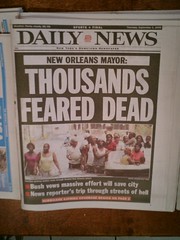'In my belief, God judged New Orleans for the sin of shedding innocent blood through abortion,' said Lefemine, who e-mailed the flesh-toned weather map to fellow activists across the country and put a stark message on the answering machine of his organization, Columbia Christians for Life.
Is Lefemine right? What are we to believe concerning the devastation left by Hurricane Katrina? The theodicy discussion surrounding Katrina is ramping up. Here are a few links.
Seeking Justice, of Gods or the Politicians
Katrina: Not God's Wrath--or His Will
Hard Path to Salvation
This section from Greg Boyd's response to the 9/11 attacks has always resonated with me. I think it is again apropriate to consider when wrestling with a Hurricane Katrina theodicy.
Jesus had a very different approach to atrocities like the one we have experienced. When a multitude of Galileans were murdered by Pilate, Jesus asked a crowd, “Do you think that because these Galileans suffered in this way they were worse sinners than all other Galileans?” He answered, “No, I tell you; but unless you repent, you will all perish as they did” (Luke 13:1–3). When a tower fell and killed eighteen people, Jesus asked, “do you think that they were worse offenders than all the others living in Jerusalem?” And again he answered, “No, I tell you; but unless you repent, you will all perish just as they did” (Luke 13:4–5). Jesus is saying that people should not try to discern the punishing hand of God in atrocities. They should rather concern themselves with their own relationship with the Father.
This attitude characterized all of Jesus’ ministries. He spent his ministry reaching out to people who were in different ways victims of a fallen, cursed world: the marginalized, the oppressed, the deaf, the mute, the blind, the deformed, the demonized. And Jesus never suggested that their affliction was punishment for sins they or someone else committed. Indeed, never once did Jesus suggest that their affliction in any way fit into a divine plan. On the contrary, Jesus assumed that their affliction was contrary to God’s will. Rather, Jesus expressed God’s will by coming against these afflictions. Indeed, often Jesus explicitly identified the ultimate source of their afflictions as being Satan or one of his demonic cohorts (e.g. Luke 11:14, 13:11–16; Mark 9:25; cf. Acts 10:38; 1 John 3:8).
So what do you think?


3 comments:
Certainly we're all deserving of punishment, all humanity has sinned, and are far worse than even we realize. It's only God's great mercy that keeps him from acting with true justice, as in the days of Noah. And that's been true through all of human history.
So, if this was Gad's wrath, it's certainly deserved. And you can see him puniching with death in both Old and New Testaments, so it's not at all unlike him to do so.
I find it telling that the Elijah List is able to show a prophetic warning about Katrina had been given. But they also show a proper response to that fact. A prophetic warning is given so we can pray, humble ourselves, and repent. Remember Jonah's story, hor Ninevah was spared? And if we aren't the ones focused on, it's still our job to pray, so that disaster may be diminshed or even prevented (note the opposite shown in Ezekiel 22:30).
In any case, it's not up to us to determine what God was doing, or not doing, in the causes of this. If it was punishment, it was just. Our job is to love, to provide for those hurt, to be Jesus to everyone affected by this. And if we as a church failed to avert this through a lack of spiritual watchmenship, through a failure to aware of the spiritual weather, a failure to pray, then it's also our job to learn from our mistake so that we're prepared for the next time.
I've blogged on this already, but the gist is that God's judgment is on us all. Why would we think we can call Katrina God's judgment on the sinfulness of New Orleans and ignore the poor folks of Mississippi and Alabama? Why was the home of sinfest Mardi Gras, the French Quarter, the least affected portion of New Orleans.
I've read elsewhere that groups like those putting together Elijah List have all kinds of other "prophecies" made. Most of them are false demonstrably. So why bring up a group of false prophets?
The final point is that we are all under God's judgment. That's the point of Luke 13:1-9. We all must repent, not simply to avoid earthly disasters, but to avoid the punishment of hell.
Agreed, we all are under judgement, and aside from God's grace, are destined for hell. Nevertheless, there are particular punishments. It's biblical fact, and Acts 5 shows that it didn't end under the new covenant. Why God does some things in particular rather than others is a question that cannot really be answered. What we see as the level of need or deservingness is no way to determine what God's intent was...imagine trying to interpret biblical events that way!
In fact, that leads to my other point. I can't speak for other groups "like" the Elijah list, I haven't examined any. However, the presence of false prophets does not negate the truthfulness of real prophets (if it did, we'd have to strip almost all the OT prophets out of the bible). From what I've seen, the people posting on the Elijah List are accurate. Certainly the stuff about Katrina is a matter of record, you can go search their archives yourself. To assume they're false prophets without examining the evidence is ridiculous. Unless you're a cessasionist, in which case such blanket statements would make sense, and that a whole different discussion (and certainly your points weren't written from that direction).
In any case, none of that was my final point. Maybe I didn't write as clearly as I intended before, but I'm unsure as to what Katrina was. It might be punishment (which we ALL deserve), it might have been an attack from Satan that we failed to avert through prayer. It might be both, or neither. At this point, it doesn't matter much. What matters is that we "pray in" anything God will accomplish through this, and use the opportunity of need to love on our neighbors.
Post a Comment